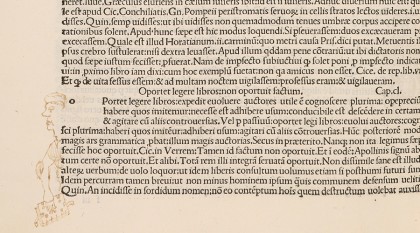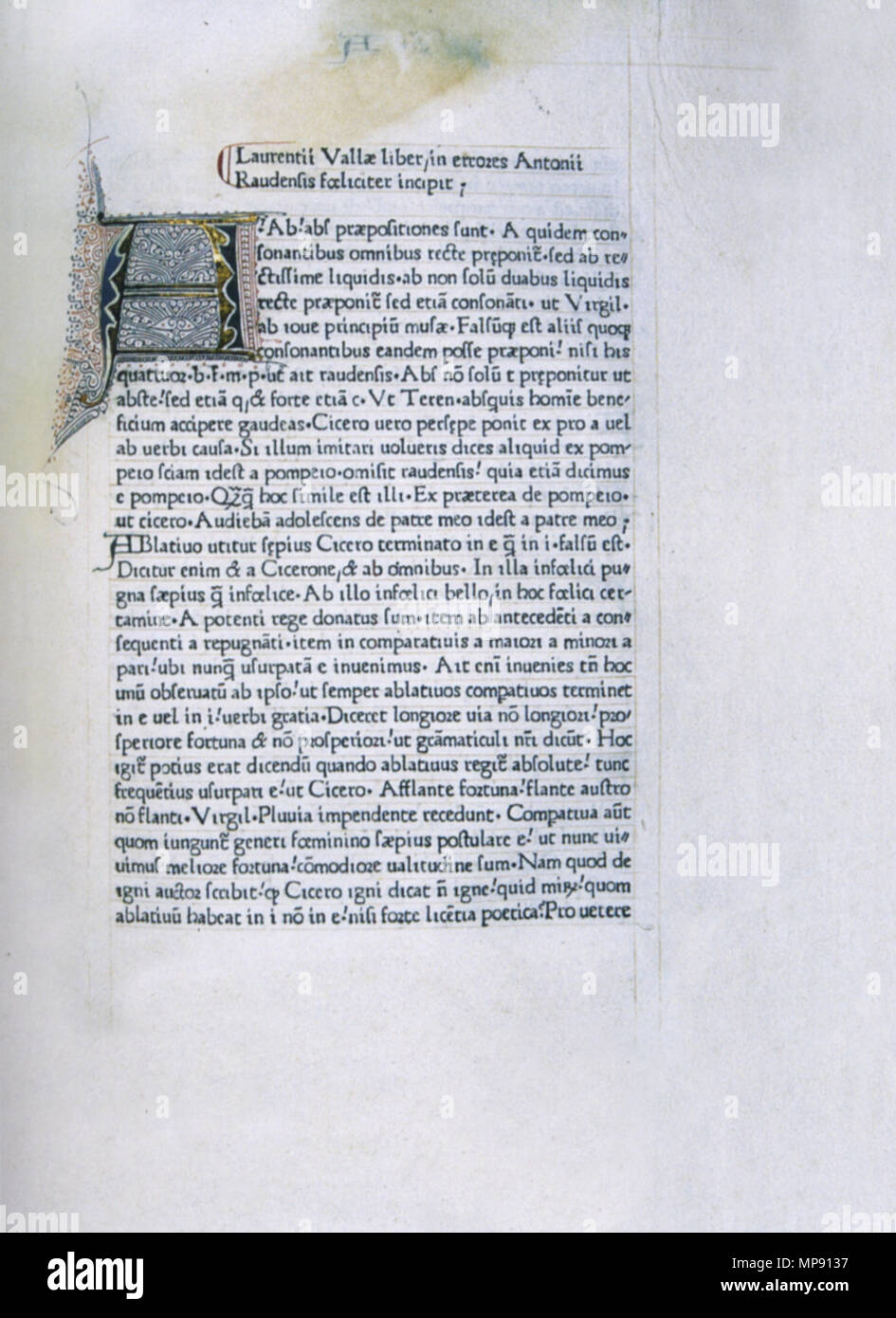
Valla made a contemporary reputation with two works: his dialogue De Voluptate and his treatise De Elegantiis Latinae Linguae. He argued that the practice of penance rested on Jerome's use of the Latin word paenitenia (penance) for the Greek metanoia, which he believed would have been more accurately translated as "repentance." Valla's work was praised by later critics of the Church's penance and indulgence system, including Erasmus. In his critical study of the official Bible used by the Roman Catholic church, Jerome's Latin Vulgate, Valla called into question the church's system of penance and indulgences. Livium, Valla elucidates numerous corrupt passages and criticises the attempts at emendation made by Panormita and Facio, his rivals at the court of Alfonso V. In this part of the treatise, which also circulated independently under the title Emendationes in T. The emendation of Livy was also a topic discussed in book IV of his Antidotum in Facium, an invective against Bartolomeo Facio. Textual criticismĪ specialist in Latin translation, Valla made numerous suggestions for improving on Petrarch's study of Livy. In addition, Valla believes that the quality of Latin for such a supposedly important text was undeniably poor, evidencing this by the fact that the text constantly switched tenses from "we have proclaimed" to "we decree", for instance. Supplementing these points, Valla argued from anachronism: the document contained the word satrap, which he believed Romans such as Constantine I would not have used.

Valla doubted that Emperor Constantine had gifted Pope Sylvester anything at all, suggesting a mistake involving an earlier Pope.From the absence of contemporary evidence, Valla reasoned that it was implausible that a major change in the administration of the Western Roman Empire had taken place.By stating that the Emperor Constantine could not have legally given Pope Sylvester the powers that the Donation claimed.Valla demonstrated that the internal evidence in the Donation told against a 4th-century origin: its vernacular style could be dated to the 8th century. This was an act of gratitude for having been miraculously cured of leprosy by Pope Sylvester I.Īt this time, Valla was employed by Alfonso V of Aragon, who was involved in a territorial conflict with the Papal States, then under Pope Eugene IV. It suggests that Constantine I gave the whole of the Western Roman Empire to the Roman Catholic Church. Erasmus stated in his De ratione studii that for Latin grammar, there was "no better guide than Lorenzo Valla." Works On the Donation of Constantineīetween 14 Valla wrote the essay, De falso credita et ementita Constantini Donatione declamatio, which analyzed the document usually known as the Donation of Constantine. Luther had a high opinion of Valla and of his writings, and Robert Bellarmine called him "Luther's precursor". He appears as quarrelsome, combining humanistic elegance with critical wit and venom, and an opponent of the temporal power of the Catholic Church. Older biographies of Valla give details of many literary and theological disputes, the most prominently one with Gianfrancesco Poggio Bracciolini, which took place after his settlement in Rome.

Invited to Rome by Pope Nicholas V, Pope from 1447 to 1455, and the founder of the Vatican Library, Valla worked there on his Repastinatio. He became itinerant, moving from one university to another, accepting short engagements and lecturing in many cities.

His tenure at Pavia was made uncomfortable by his attack on the Latin style of the jurist Bartolus de Saxoferrato. Valla went to Piacenza, and then to Pavia, where he obtained a professorship of eloquence.

He was unsuccessful, despite his network of contacts. In 1431, Valla entered the priesthood and tried in vain to secure a position as apostolic secretary. But Valla had caused offence, to Antonio Loschi, and by championing the rhetorician Quintilian in an early work. īruni was a papal secretary Melchior Scrivani, Valla's uncle, was another. He is thought otherwise to have been largely self-taught. He was educated in Rome, attending the classes of teachers including Leonardo Bruni and Giovanni Aurispa, from whom he learned Latin and Greek. Valla was born in Rome, with a family background of Piacenza his father, Luciave della Valla, was a lawyer who worked in the Papal Curia.
LORENZO VALLA DE ELEGANTIAE LINGUAE LATINAE TRIAL
Subsequently, he was put on trial before the Catholic Inquisition in 1444 he was saved by the King of Naples, Alfonso V of Aragon. He is best known for his historical-critical textual analysis that proved that the Donation of Constantine was a forgery, therefore attacking and undermining the presumption of temporal power claimed by the papacy. 1407 – 1 August 1457) was an Italian Renaissance humanist, rhetorician, educator, scholar, and Catholic priest. Lorenzo Valla ( Italian: also Latinized as Laurentius c.


 0 kommentar(er)
0 kommentar(er)
